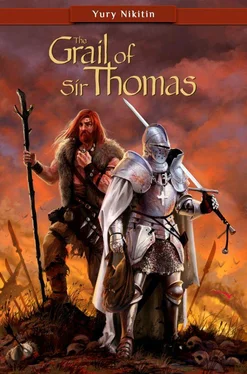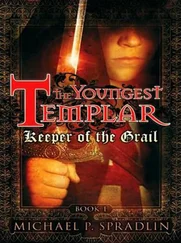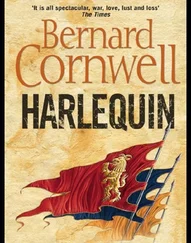Yury Nikitin - The Grail of Sir Thomas
Здесь есть возможность читать онлайн «Yury Nikitin - The Grail of Sir Thomas» весь текст электронной книги совершенно бесплатно (целиком полную версию без сокращений). В некоторых случаях можно слушать аудио, скачать через торрент в формате fb2 и присутствует краткое содержание. Жанр: Фэнтези, на английском языке. Описание произведения, (предисловие) а так же отзывы посетителей доступны на портале библиотеки ЛибКат.
- Название:The Grail of Sir Thomas
- Автор:
- Жанр:
- Год:неизвестен
- ISBN:нет данных
- Рейтинг книги:5 / 5. Голосов: 1
-
Избранное:Добавить в избранное
- Отзывы:
-
Ваша оценка:
- 100
- 1
- 2
- 3
- 4
- 5
The Grail of Sir Thomas: краткое содержание, описание и аннотация
Предлагаем к чтению аннотацию, описание, краткое содержание или предисловие (зависит от того, что написал сам автор книги «The Grail of Sir Thomas»). Если вы не нашли необходимую информацию о книге — напишите в комментариях, мы постараемся отыскать её.
The Grail of Sir Thomas — читать онлайн бесплатно полную книгу (весь текст) целиком
Ниже представлен текст книги, разбитый по страницам. Система сохранения места последней прочитанной страницы, позволяет с удобством читать онлайн бесплатно книгу «The Grail of Sir Thomas», без необходимости каждый раз заново искать на чём Вы остановились. Поставьте закладку, и сможете в любой момент перейти на страницу, на которой закончили чтение.
Интервал:
Закладка:
Still embracing the small woman, he led her to the dark cave entrance. At some moment the woman seemed to make a move away but the strong arm kept holding her narrow shoulders and she went limp, clung to him like a supple vine to a mighty oak.
Thomas twisted, guessing how he could express his apprehension delicately. That’s no woman but a full armory. Oleg and Gulcha were already at the cave threshold when Thomas yelled at the top of his voice, as if he were storming the Tower of David again. “Sir wonderer! Oleg! If last time… Seljuk, what now? Think about the future! Or your victory will become a defeat…”
Oleg looked back. The knight was clasping the Holy Grail with both hands at his iron chest. He had the eyes of a scared deer. The petite woman stopped. For a while the wonderer stood thoughtful: maybe he was thinking about the future. The woman felt his hesitation, cuddled up to him with her whole body. “Future?” Oleg asked vacantly. “Off chance it will come right.”
The last thing Thomas could see – while the wonderer could not – was that her hand, the one remained free, darted to the luxurious mane of her hair, tore out a pitch-dark single hair, and threw aside. Then the couple vanished in the black gape of the cave.
Thomas stopped breathing. The single hair transformed imperceptibly into a snake, as black as sin. It stirred, went crawling to the cave entrance. Thomas jumped after it. A champ under his boots, a splatter of dark stinky blood. Thomas trampled down for a while to make it sure, spreading the black flesh, bones, and even skin on the stones, then wiped his soles clean with disgust. His heart pounded as if he were a hare caught by a wolf.
He sat down near the entrance, set the bare sword up menacingly at his feet. The wonderer won’t beat off a gnat now. I must guard. His thoughts floundered fussily around the tribe that would ruin Constantinople in centuries to come. Then a burning question flashed: what would the people who come of him, highborn Angle Thomas Malton of Gisland, be like? Where, in which unknown land would they create their unprecedented state? Would his descendants bear some resemblance to him, a modest knight errant?
Well, I’m not likely to find it out until morning comes. The creation of new tribes and nations must be time-consuming.
###
About the author
Born in Kharkiv, USSR in 1939, Yury Nikitin has changed 32 jobs before writing his first novel about foundry workers. Soon after that, his name got blacklisted for many years, but in the post-Communist Russia he became one of the most famous and best-selling writers in fantasy and science fiction. Today Yury Nikitin is the author of more than 60 novels, distinctive by their captivating style, action-packed storylines, elaborated half-historical half-mythological background, and characters who evolve and transform as unpredictably as real people do.
You may contact Yury Nikitin online at Facebook: http://www.facebook.com/ury.nikitin
Endnotes
(1) In the original text Oleg names himself kalika [kali’ka], which is a Russian word for pilgrim and wanderer. Since late Middle Ages, it was mostly used to mean a vagrant beggar singer of religious songs, especially the one physically impaired (Russian word kaleka [kale’ka], meaning a cripple, derived from it). Also, kalika is a character of Russian mythology. In some legends, they have great physical strength and perform heroic deeds and wonders. In non-fictional contexts, kalika is commonly translated into English as simply pilgrim , but that does not encompass the full scope of meanings conveyed in this fiction book and explained above, so the word wonderer was adopted instead to convey the original message as close as possible. (The references here and after by translator)
(2) Rus’, or Kievan Rus’, is a Slavic state that existed in NE Europe, on the present-day territories of Ukraine, Belorussia and Western Russia, between the 8th and the 14th centuries AC.
(3) Targitai is a legendary hero and ancestor of Scythians (mentioned by Herodotus and Diodorus). Koloksai is a legendary prince of Scythia, son to Targitai.
(4) The word ustye [u’stje] also stands for the mouth of the river in Russian language today. The theory of the common Scythian roots of Russian, English and many other European and Asian nations advocated by Oleg here and forth in this book is one of many all-likely-to-be-true hypotheses in contemporary historical research in Russia and other countries.
(5) A legendary northern land described by Herodotus and many other ancient writers. The author identifies it with the territories once occupied by Kievan Rus’ and now belonging to Russia, Ukraine, and Belorussia.
(6) Justinian I the Great (483-565), Byzantine Emperor in 527-65. His Slavic origin implied by this book is rather a legend than a historical fact.
(7) Old Russian name for Constantinople.
(8) Scythia is an ancient region of SE Europe and Asia. The Scythian empire, which existed between the 8th and 2nd centuries BC, was centered on the northern shores of the Black Sea and extended from southern Russia to the borders of Persia.
(9) An old Russian measure of weight (about 16.4 kg).
(10) An old Russian measure of length (about 1.1 km)
(11) Khazars are Turkic people who occupied a large part of southern Russia from the 6th to the 11th centuries and who converted to Judaism in the 9th century. The existence and ways of Hazars are entirely the author’s imagination.
(12) In fact, Buddha was born in 563 BC and Mahomet in 570 AC
(13) A hint on the well-known in Russia saying by Otto Bismarck, “The Russian man harnesses the horse slowly but drives fast.”
(14) The five-pointed star is considered to be a Masonic symbol. Later, it became the official symbol of Communists who put five-pointed stars on the tops of five towers of Moscow Kremlin in 1935-37. Those stars were removed in the 1990s.
(15) Old Russian name for Byzantines.
(16) Theodora (500-48), Byzantine Empress, wife to Justinian I.
(17) Old Russian name for British Isles.
(18) A well-known hero of Russian epic.
(19) Agathyrs, Gelon, and Scyth are legendary Scythian heroes, sons (or, by other versions, grandsons) of Targitai. According to the legend, Scyth was the only one of three brothers who succeeded in drawing Targitai’s bow, so he and his people remained in Scythia, while his brothers led their tribes away to settle down in other lands. The colonization of great caves by Agathyrs and his people is the author’s assumption.
(20) Vladimir I the Great (958-1015), a Grand Prince of Kiev, ruler of Kievan Rus’ in 980-1015. Originally a Slavic pagan, he converted to Christianity in 988 and Christianized the Kievan Rus’. His having hundreds of wives and concubines while a Pagan is a historical fact.
(21) Slavic tribes who lived to the north of the Black Sea between 4th and 7th century AD were named Antes by Byzantine writers of that time.
(22) Herodotus (484-425 BC) wrote about giant ants who, in his opinion, lived in Scythia.
(23) Sazhen is an old Russian measure of length (about 2.16 m).
(24) “To pass Crimea and Rome” and “to have seen [spent a night under] the priest’s pear tree” are well-known Russian sayings about a person who has seen much of life (e.g. because he or she has traveled a lot) and who is supposed to be very experienced and worldly-wise.
(25) A small river near Kiev. In the waters of Pochayna, Prince Vladimir performed the christening of all Kievins in 988 AC.
(26) Here and below, Oleg retells a Greek legend.
(27) The ancient Russian writing (“lines and cuts”) and ancient Celtic writing actually look very similar at a glance. However, the possibility and probability of their common origin is an issue of debate in present-day academic literature.
Читать дальшеИнтервал:
Закладка:
Похожие книги на «The Grail of Sir Thomas»
Представляем Вашему вниманию похожие книги на «The Grail of Sir Thomas» списком для выбора. Мы отобрали схожую по названию и смыслу литературу в надежде предоставить читателям больше вариантов отыскать новые, интересные, ещё непрочитанные произведения.
Обсуждение, отзывы о книге «The Grail of Sir Thomas» и просто собственные мнения читателей. Оставьте ваши комментарии, напишите, что Вы думаете о произведении, его смысле или главных героях. Укажите что конкретно понравилось, а что нет, и почему Вы так считаете.












